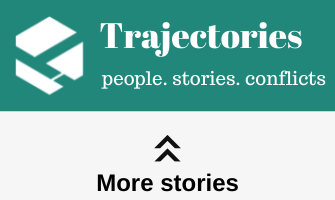Preparing nations for peace. Episode 2
What does Azerbaijan expect from the peace talks in Sochi and Brussels?
On November 26, peace talks were held between the leaders of Azerbaijan and Armenia with the mediation of the President of Russia. On December 15, Armenia and Azerbaijan going to hold a “second round” of negotiations within the framework of the summit in Brussels, with the mediation of the President of the European Council.
These negotiations were preceded by the most serious ceasefire violation since the signing of a trilateral Azerbaijani-Armenian-Russian ceasefire agreement of the 44-day war and the outline of a future peace settlement. On November 16, local battles lasted for six hours on the Armenian-Azerbaijani border, both sides suffered casualties.
Why can’t the parties come to an agreement? In my opinion, both sides stated “maximum goals” even before the war. Neither Baku, nor Yerevan have spoken about any concessions.
After the war, the Azerbaijani president continued the same rhetoric, announcing that Armenia had surrendered on November 10, after the 44-day war. Although, what kind of victory was it, if the troops of three foreign states – Russia, Armenia and Turkey – are located on the internationally recognized territory of Azerbaijan?
The leadership of Azerbaijan is still forced to concede.
Before the meeting in Sochi, several arrested citizens of Armenia were released, this is normal and good. I was also surprised by the fact that they removed the dummies of the Armenian militants from the Trophy Park as well as advertisements like “Zangezur Is Ours” from city buses. This makes me happy.
Another softening of Azerbaijan’s maximalist position can be considered a change in attitude towards the OSCE Minsk Group, which has an official mandate to mediate in the conflict. A month after the end of the war the Minsk Group co-chairs were recieved in Baku with a very cold reception (“You were not invited”), but a year later, the Minsk Group resumed its mediation mission, however, so far only at the level of foreign ministers.
A year has passed since the end of the second Karabakh war. The promised “surrender” did not happen. The euphoria is gradually wearing off. The society of Azerbaijan also understands that the promised “surrender” did not happen. So, what’s next?
The first option is to tighten the belts. Prices and levies for small and medium-sized businesses are growing. With this, everything is clear. I am sure that the majority of the population will support these measures: “We should be patient. We will wait and gradually get rid of the Karabakh Armenians and the Russian “peacekeepers”.
The second option: what if the government decides to get rid of the Karabakh problem once and for all? That is, exchange the territory under the control of the Russian peacekeepers for the Zangezur corridor.
It sounds very unlikely. First, as far as I can judge from social media and publications in the Armenian media, the majority of the population of Armenia is categorically against it. But let me remind you that Heydar Aliyev discussed this in Key West – an we are not smarter than him.
In Azerbaijan, most of all, they expect the opening of a land transport “corridor” with Nakhchivan. Politics aside, it is very profitable economically, there is no need to pay duties and travel through Iran. Well, politics too, of course, as it would give access to Turkey. However, an ordinary driver would not care much for politics.
It is beneficial for Iran, since the “transport hub” of Julfa will start working and Iranian goods will reach Yerevan faster.
This is also beneficial for Armenia, I am sure the Turkish-Armenian border will open as well.
This is beneficial for Russia, since it will be able to control everything and open a railway connection with Armenia bypassing Georgia.
Finally, this is beneficial for Turkey. It will officially become a regional power in the South Caucasus. In addition, Turkish small and medium-sized businesses will enter the Armenian market.
It is not, however, profitable for Georgia since it will lose the money it gets for transit.
After the Brussels meeting, PPP (Preparation people for Peace – Western diplomats call it PPP) will once again come to the agenda. I hope experienced civil society will also be invovled in this process. It is a pity that Georgy Vanyan and Avaz Hasanov will not be with us.
Trajectories is a media project that tells stories of people whose lives have been impacted by conflicts in the South Caucasus. We work with authors and editors from across the South Caucasus and do not support any one side in any conflict. The publications on this page are solely the responsibility of the authors. In the majority of cases, toponyms are those used in the author’s society. The project is implemented by GoGroup Media and International Alert and is funded by the European Union




















